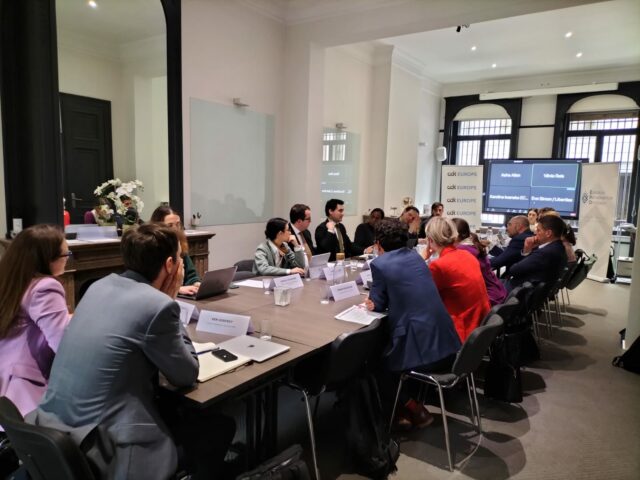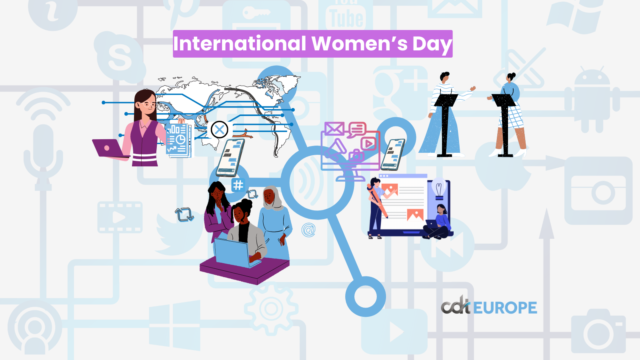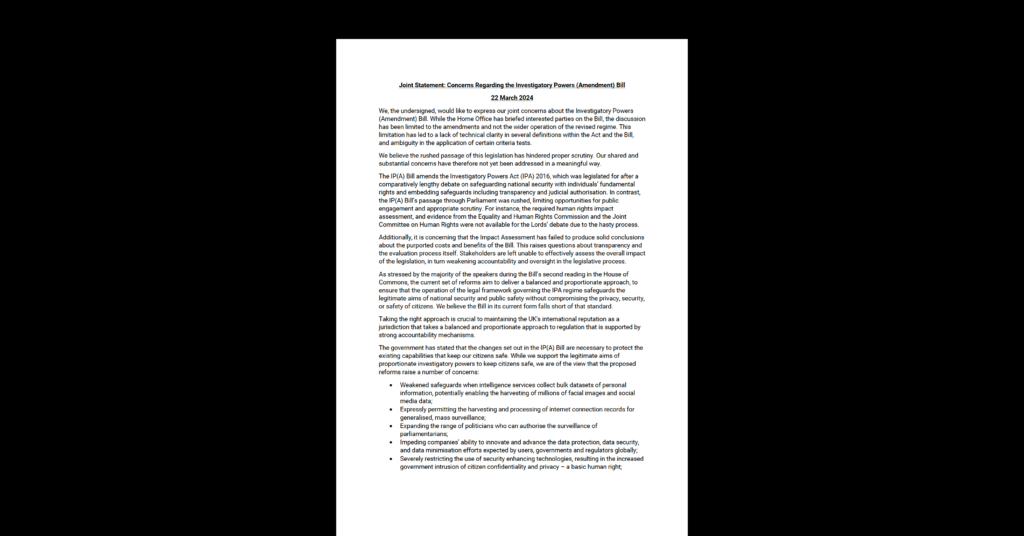EU Tech Policy Brief: April 2023
Also authored by CDT Europe’s Vânia Reis and Rachele Ceraulo
This is the April 2023 issue of the Centre for Democracy & Technology Europe‘s monthly Tech Policy Brief. It highlights some of the most pressing technology and internet policy issues under debate in Europe, the U.S., and internationally, and gives CDT’s perspective on them. Our aim is to help shape policies that advance our rights in a digital world. Please do not hesitate to contact our team in Brussels: Iverna McGowan, Asha Allen, and Ophélie Stockhem.
CDT Europe Warns against Risks of AI Systems in Hiring and Stresses the Need to Align the EU AI Act with EU Equality Laws
In a new blog, CDT Europe discusses the risks raised by the use of AI hiring systems, in particular the potential risks of discrimination based on gender and disability. The blog analyses obligations currently under negotiation in the draft EU legislation, and highlights the limited access to judicial remedy for victims who have been discriminated against by an AI system during a hiring process.
CDT Europe welcomes negotiators’ current proposals to integrate a complaint and appeal mechanism into the EU AI Act. Further, we advocate for extending such a mechanism to cover remedies for infringements by both providers (developers) and users (deployers) of AI systems, including employers of discriminatory AI systems. We also stress the importance for national supervisory authorities, who are in charge of overseeing the EU AI Act, of closely collaborating with courts on the matter.
We conclude by calling upon EU institutions to create a legal framework for deploying AI systems in the EU that ensures protections provided by EU equality laws are upheld in the context of hiring. For instance, in the case of hiring discrimination, such a framework might shift the burden of proof to the employer.
CDT Europe and European Partnership for Democracy Host Roundtable on Political Advertising in Europe

On 7 March 2023, CDT Europe and the European Partnership for Democracy held a roundtable discussion on recent developments in the draft EU Regulation on the Transparency and Targeting of Political Advertising, with representatives from the European Commission, EU member states, and civil society organisations. The event, moderated by Asha Allen and hosted in CDT Europe’s office in Brussels, focused on civil society’s key priorities for the ongoing interinstitutional negotiations on the draft Regulation.
Participants exchanged on key elements of the file, such as the definition of political advertising, what constitutes meaningful transparency measures, and how to ensure that the regulation fully protects human rights and election integrity. The roundtable also allowed participants to identify opportunities for a multistakeholder approach to effective enforcement and implementation of the Regulation ahead of the European elections in 2024.
CDT Europe Joins Euronews to Talk Use of AI Systems in Migration, Encryption, and TikTok

On 18 March 2023, CDT Europe’s Secretary General Iverna McGowan joined an episode of ‘Brussels, my love?’, the new Euronews talk show that aims to break down European news and politics in an accessible way.
McGowan shared her reflections on recent proposals by the EU Commission on asylum and migration in Europe, and voiced concern that they might result in increased surveillance of marginalised and at-risk groups such as asylum-seekers, migrants and refugees.
The panel also discussed the recent decision to ban the TikTok application from EU institutions’ work devices to prevent security concerns. As public conversation in the EU on TikTok continues, McGowan stressed the need to ensure robust enforcement of privacy and data law, to preserve end-to-end encryption, and to avoid banning apps — which would have a disproportionate impact on free expression.
She also raised concerns at the inconsistency of EU policy on security, highlighting how on one hand EU officials are obliged to use Signal when communicating with external stakeholders, but at the same time, the European Commission has tabled a proposal that would break end-to-end encryption for everyone.
CDT Europe Joins OSCE Session on Media Pluralism as a Cornerstone of Democracy
On 14 March 2023, Asha Allen, CDT’s Advocacy Director for Europe, Online Expression & Civic Space, joined the Organization for Security & Co-operation in Europe (OSCE)’s Supplementary Human Dimension Meeting on Media Freedom as a Central Pillar of Comprehensive Security, a forum fostering public debates on the nexus between media freedom and security in OSCE countries.
Speaking at a session on the relationship between a stable democracy, media freedom, and the role of journalists, Allen discussed the role of the media in achieving gender justice, and raised concerns about the challenges women journalists face when conducting their work in the digital sphere. In particular, she highlighted how online gender-based violence (OGBV) and gendered mis- and disinformation are specifically intended to prevent politically engaged women, including journalists, from contributing to public debates.
Allen warned that these challenges have a direct effect on the media ecosystem, as OGBV impacts women’s ability to contribute safely to a pluralistic media environment. She outlined a clear set of policy measures for how policymakers at national level should tackle these hurdles, such as supporting more research on gendered online disinformation and societal challenges to media freedom.
Allen further urged Member States to support awareness-raising efforts and educational programs for media organisations, to create a deeper understanding of gendered disinformation. Finally, she recommended adopting an intersectional methodology in the development of policies related to strengthening media freedom, to ensure robust protections for the most marginalised and impacted by these phenomena.
On International Women’s Day, CDT Europe Calls for a Human Rights-Centred Legal Framework to Tackle Online Gender-Based Violence

On 8 March 2023, CDT Europe published a new blog to mark International Women’s Day, in which we outline the need for a harmonised, human rights-centred legal framework on online gender-based violence (OGBV). We highlight that OGBV can take many forms, and diminishes equal access, safety, and participation in the online sphere, causing a chilling effect on women and non-binary people’s speech.
CDT Europe welcomes attempts by the EU to tackle these challenges, including the recent proposal for a directive on combating violence against women and domestic violence, but raises concerns about the vagueness of the definitions contained in the draft legislation, which fail to align with international human rights standards and the preservation of free expression.
We also echo the importance of the Digital Services Act’s mandatory due diligence obligations, which require very large online platforms and search engines to assess and mitigate the risk of online GBV within this context, and reiterate the importance of conducting and developing these measures through a comprehensive and intersectional human rights lens. To conclude, CDT calls on the EU to ensure alignment of the Directive on GBV with the DSA.


